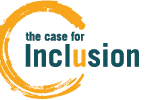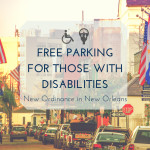
Trending Stories on Disability
Local, National and International articles on Disability Issues.
Click on the links in colored type to read the stories impacting the disabled community today and in the future.
- A disabled teen who cannot speak is now able to communicate after a friend created an LED board to help him answer questions. Technology rules!
- Tulane students are training puppies to assist the disabled. After successfully completing the advanced training, the dogs are then fully certified as service dogs and are matched with individuals with disabilities.
- Lafayette Parish schools receive new funding for students with disabilities. In all, the state of Louisiana is allocating $4 million in grants for the resources, which will go toward helping improve graduation rates and career preparation for students after high school.
- Cerebral People is a film in which young people with cerebral palsy take over the camera to tell their own stories about life with the condition, The film will help young people to understand of their condition and to manage it better as they approach adulthood.
- Should people with autism be described as disabled? Here’s a thought provoking article by Disability Journalist Nick Cohen on the cheating language of equality and the pitfalls of labels.
The Potentially Life-Saving iPhone Feature You Probably Didn’t Notice
Many people keep an emergency contact in their phone, generally labeled as ICE. If you use a passcode for your phone—which you should do—that contact, though, becomes locked underneath your pin code.
Last fall, Apple created a new feature called the “Medical ID” which it keeps hidden in the iOS health app. When I talk with people about their phones, it’s often the feature most people have never heard of, but also the one that could save your life.
On your medical ID, you can fill out as much information as you want a medical provider (or a snooping colleague) to know, including allergies and your emergency contacts.
I’m not a medical professional and those who have serious health conditions that generally require a medical bracelet or other identification means probably shouldn’t rely on their cell phone to communicate that information.
That being said, filling out your medical ID to at least make your emergency contact accessible without needing to enter a passcode is important. Here’s how to do it:
The Medical ID can be accessed from the iPhone’s emergency screen. When you’re on your lock screen, it’s the “Emergency” on the bottom left.
How Well Does Louisiana Serve Those With Disabilities?
Medicaid affects all of us: children and adults with disabilities, as we age, as our family ages, and when the unexpected happens.
United Cerebral Palsy’s The Case for Inclusion, ranks all 50 states and the District of Columbia (DC) on outcomes for Americans with intellectual and developmental disabilities (ID/DD).
Louisiana ranked 24th out of 50 states and the District of Columbia. You can view our state scorecard
here.
This year’s report shows that:
- All states have room for some improvement, but some have consistently remained at the bottom of the rankings since 2007;
- Waiting lists for residential and community services remain high, demonstrating the unmet need of people with disabilities and their families;
- Just 8 states, down from 10 last year, have at least one-third (33 percent) of individuals with ID/DD working in competitive employment— showing significant opportunity for improvement in employing people with disabilities;
- 14 states report successfully placing at least 60 percent of individuals in vocational rehabilitation in jobs. Only California met the standard on all three success measures this year.
Free Parking in Metered Spaces for Disabled in New Orleans

Did you know an ordinance passed the New Orleans City Council last year allows for any car with a license plate, hang tag or special parking card “impaired mobility” designation to park free in metered spaces for up to 3 hours? Vehicles have to be transporting the person with disabilities at the time to qualify.
Many new meters have been installed downtown which could not be reached by many in wheelchairs. In some cases, it is difficult to navigate the curb to sidewalk transition to get to the meter especially in areas that don’t have wheelchair accessible curb cuts. In other cases with new centralized, electronic meters, the meter is so tall or installed in such a way that it can not be reached at all by many in wheelchairs.
The ordinance doesn’t allow parking in a fire lane or in areas where a car might be a traffic hazard.
Louisiana Passes Legislation Establishing ABLE Accounts
During the week of Fourth of July, Louisiana joined Iowa and Hawaii in passing legislation establishing ABLE accounts.
The ABLE Act will allow certain individuals with disabilities and their families the opportunity to contribute to a tax-exempt savings account that can be used for maintaining health, independence and quality of life. As passed, the ABLE Act requires each state to independently establish, implement or contract with other states on the availability of ABLE accounts.
National Disability Institute (NDI) has long championed the ABLE Act as a critical strategy to providing a pathway to a better economic future for all people with disabilities. As the nation’s first nonprofit dedicated to improving the financial health and future of all people with disabilities, the organization has extensively documented and called attention to the daily reality and extra expenses associated with living with a disability, and the challenges of navigating the complex web of government rules to maintain public benefits eligibility.
To learn more about the ABLE Act, click
here.
10 Little Known Facts about Cerebral Palsy
-
Cerebral palsy is not a birth defect, disease, or communicable condition.
Cerebral palsy results because of either brain damage or abnormal brain development. The mitigating factors that lead to cerebral palsy usually occur in utero or during the birthing process.
-
Cerebral palsy is not as rare as some people think.
Cerebral palsy is a motor disability condition that affects approximately three out of every 1,000 children. In most cases, children are not diagnosed until they are approximately two or three years of age. There is no clear and concise test for diagnosing cerebral palsy. Doctors usually make a diagnosis based on observation, parental input, development, and in some cases, an MRI.
-
There is more than one type of cerebral palsy.
The term “cerebral palsy” refers to a group of disorders that affect a child’s movements. Spastic cerebral palsy leaves the muscles stiff much of the time; athetoid cerebral palsy can cause either slow and writhing movements or slow and jerky ones; and ataxic cerebral palsy usually causes problems with coordination. There can also be mixed forms of the conditions, and spastic CP is also categorized based on which body parts are involved.
-
The severity of the condition varies.
Not everyone with CP reacts in the same way. Some people only experience a little bit of weakness in one arm or hand while others are confined to wheelchairs or suffer from speech impairments.
-
Cerebral palsy can affect all the muscles, big and small.
Cerebral palsy can affect the signals that muscles receive from the brain, so they don’t always work the way they should.
-
Muscles can be tight or loose.
Muscles can be tight or loose. It depends where the brain damage occurred and how severe it was.
-
The symptoms can vary on a daily basis.
The muscles can change how they react for many reasons. The muscles can loosen or tighten depending on the weather or even the mood of the patient.
-
Cerebral palsy is incurable.
While there are effective therapies to help patients deal with their condition, at the present time there is no cure for CP. More research is necessary in order for that to even be a possibility in the future.
-
The condition has no affect on a person’s personality.
Cerebral palsy does not affect a person’s personality or disposition. The only disability is the outward physical appearance and functions.
-
Do not feel sorry for people who have cerebral palsy.
While children with cerebral palsy face more challenges than other children, others should not feel sorry for them. The challenges they face are part of who they are, and they are certainly not sitting around feeling sorry for themselves.



